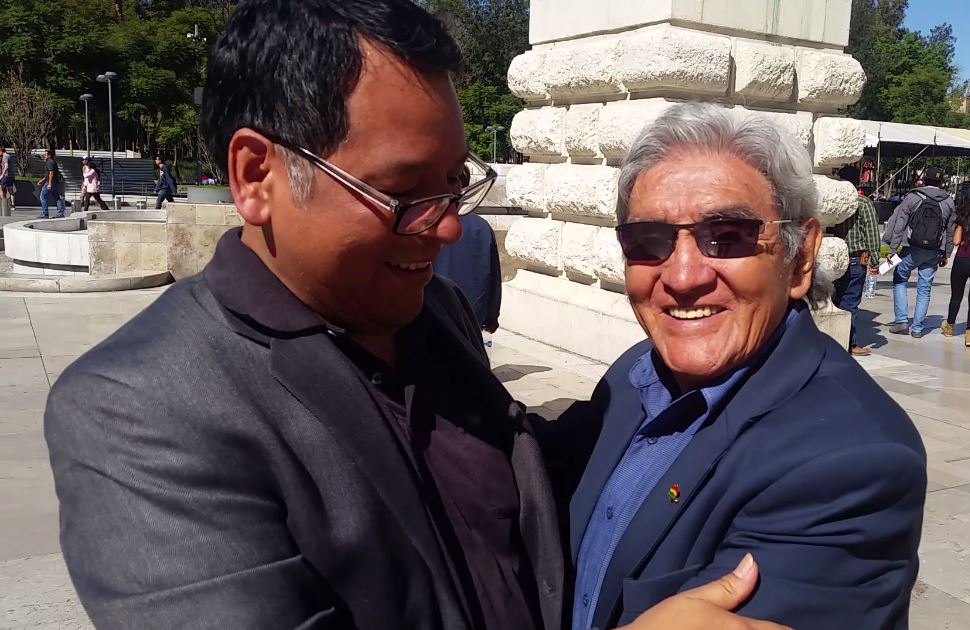
———- O ———-
MEXICO City 2014 (‘Nostalgia clusters’ prologue). Walker of silence and distances, Fidel Carlos Flores measures everyday himself in the size of his nostalgia for the soil that he loves. In his own words, nostalgia is an ‘interloper’ that thrills aged feelings and leads him back to a “quebrachos and mountain ranges vision”; he’s from the Bolivian Chaco.
The fact that what each man has learnt during his childhood is forever tattooed on him, is evidence with no contrast, especially for Flores who lives in Mexico since 1980’s decade; he has a consolidated Mexican family (wife and children), and also there he grew and strengthened as a journalist and economist, taught in universities and written for newspapers; there he is a lively promoter of art and culture, anyway, a full grown man. But no; Fidel Carlos Flores holds tight to his childhood memories of ground doves and kites, both hills and torso bare. He is someone who comes and goes looking at the south.
There among his jolly regressions we can find: “Glittering flight (…) at the border of endless Aguaragüe (and) there I can see Trumpa’s valleys, besides Chaco’s skin”. Those lines are from July 2013. He was born in a “town-border”, just as southwest people call to Argentine border adjacent cities; its name, Yacuiba, In the Great Chaco, Tarija.
Mentioning Chaco reminds to a bruised episode in the Bolivian memory, for being an example in the republican history that shall not be forgot. The region and its unworked fields in the east was the scenario of a war with Paraguay in the 1930’s decade for oil and gas (that Paraguayan people did not keep as was their wish), numberless natural resources that nowadays, under the Bolivian Estate sovereignty, report solid economic profit to Bolivian towns.
But Flores is the topic here: D.F. Septien School’s journalist and Metropolitan Autonomous University economist (UAM for its Spanish acronym) he develops his carrier handling both bridles in Mexico as well as in Bolivia. Press and the universities in Santa Cruz de la Sierra, for giving an example, know what he’s capable of and what his professional prospects are.
He has been teacher for generations, magazines editor. “Text-server” that’s how he defines himself in his poetry; also a musical sensibilities guru (he’s a percussionist of folkloric drums). Fidel Carlos is the favorite Bolivian from those who are welcome amongst the “diaspora compatriots” circles. Due to neurosis and patrimonial apprehension around this point: Bolivian communities dwelling overseas definite or indefinitely.
He goes and returns with an optimistic proposal piggyback, usually motivates a love of national character and solidarity with those in necessity whom he call “the denied ones” in one of his poems; he also says “…let us reborn a certain instant in the sphere of the common sense and with the heart inside out –offering- the righteous paradise of a giving and taking love” (The delicacy of an instant).
Flores, after all is a self-critic citizen that every kind of society needs for being authentic and necessary to mankind and its coexistence “for a mild behavior between restlessness and depression”. As he writes for his childhood towns, he does it for Mexico City, where its natives also known as “chilangos” have as motivation for the many rainy days that soak them through.
I said rain, and as well as him I turn the eyesight to the days that I met him in the Federal District, Mexico. It was in 1982 in the middle of an eager and traumatic disc recording facing with solidarity and urgency for a drought of 1200 straight days in the loved Bolivian region. Press reports and letters (then there was no internet service) exposed the social tragedy due to the lack of rain and life in the rivers, with a long trail of hunger, hopelessness and the exodus of at least half of a million of native indigenous people of northern Potosí, the place where I’m from, so I did have to react from Mexico.
Fidel Carlos Flores and his band “Calicanto” (all members, compatriots and academics) helped me giving form to that struggle onto an LP record. We performed a fine cantata named ‘Sequía’ (Drought) and the collected money in Mexico and Bolivia was given to the Human Rights organizations and the society for affected families that… Well, that’s another story and these are some frames that I keep from Fidel Carlos Flores in the hard disc of my memory.
———- O ———-
(*) Llallagua, Bolivia, 1940. Poet, journalist and writer. ‘Ramón López Velarde’ poetry prize (Mexico 1982) and ‘Club of journalists of the United Mexican States’ journalism prize (1995); ‘La Paz Journalists Association’ gold medal for professional merit and intellectual creation ‘Franz Tamayo’ (1996); La Paz Journalists Union prize to the press dignity ‘Luis Espinal Camps’ (1999); Latin American Journalists Federation and company Transredes ‘World Class people Bolivian Award’, Santa Cruz de la Sierra, Bolivia (2003), National Prize Cultures (2019), among others.
Translator: Fernando Becerril/Giselle Sánchez.

